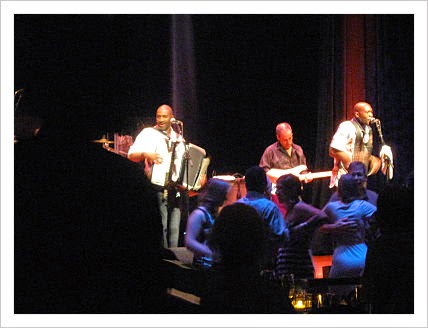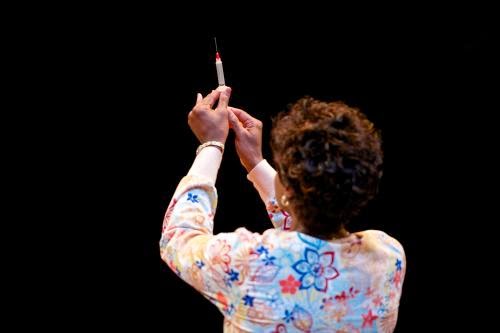 Curley Taylor and Zydeco Trouble made lots of it at the Bethesda Blues and Jazz Supper Club/Photo by Patricia Leslie
Curley Taylor and Zydeco Trouble made lots of it at the Bethesda Blues and Jazz Supper Club/Photo by Patricia LeslieWhen you hear the word "zydeco," doesn't it make you happy?
Doesn't it make you move a little?
Just a little?
Now, come on. Come on.
Me, too.
That's why I went to the Bethesda Blues and Jazz Supper Club Friday night to hear Curley Taylor and Zydeco Trouble (love that name!) entertain all the cool cats (that would include me) who showed up to listen, dance, eat, and imbibe. (Some nights are made for listening and dancing. Check the calendar.)
Curley Taylor and Zydeco Trouble at the Bethesda Blues and Jazz Supper Club/Photo by Patricia Leslie
Curley (from Louisiana, natch) got the crowd to come on down and go to town as fast as the fellow playing the electric guitar could pick one string.No timid people came to zydeco. No siree. The big dance floor filled real fast, and it never got too crowded or dark.
 Curley Taylor and Zydeco Trouble at the Bethesda Blues and Jazz Supper Club/Photo by Patricia Leslie
Curley Taylor and Zydeco Trouble at the Bethesda Blues and Jazz Supper Club/Photo by Patricia Leslie.jpg) What do you call these silver metal accordions which hang around your neck? Silver medal accordions which hang around your neck? Curley Taylor and Zydeco Trouble know what they are, at the Bethesda Blues and Jazz Supper Club/Photo by Patricia Leslie
What do you call these silver metal accordions which hang around your neck? Silver medal accordions which hang around your neck? Curley Taylor and Zydeco Trouble know what they are, at the Bethesda Blues and Jazz Supper Club/Photo by Patricia LeslieIn that sexy night hall with the columns lit by lights from down yonder, we could have been on a ship. Matter of fact, I was on a ship, one that rollicked and waved in time with the music and served up plenty of good tastings, a fast cruise like a mood lifter that didn't require popping pills.
 Time to check for messages with Curley Taylor and Zydeco Trouble at the Bethesda Blues and Jazz Supper Club/Photo by Patricia Leslie
Time to check for messages with Curley Taylor and Zydeco Trouble at the Bethesda Blues and Jazz Supper Club/Photo by Patricia LeslieThe hall is a beautiful place (with an $8 million renovation) in a 1938 art deco building with high ceilings, and attractive Indian designs on the side walls with big, tall columns and lights to give it that nightclub allure.
 Curley Taylor and Zydeco Trouble at the Bethesda Blues and Jazz Supper Club with...oriental rugs on the ceiling?/Photo by Patricia Leslie
Curley Taylor and Zydeco Trouble at the Bethesda Blues and Jazz Supper Club with...oriental rugs on the ceiling?/Photo by Patricia LeslieI do believe it's better to go to the club with a date since that's what most of the guests seemed like they were, although a few singles found dancing partners. Just my observation.
 Curley Taylor and Zydeco Trouble at the Bethesda Blues and Jazz Supper Club. Who said there were no cowboy hats on Wisconsin Avenue? It's okay to wear them at the Bethesda Blues and Jazz Supper Club. No apparel restrictions/Photo by Patricia Leslie
Curley Taylor and Zydeco Trouble at the Bethesda Blues and Jazz Supper Club. Who said there were no cowboy hats on Wisconsin Avenue? It's okay to wear them at the Bethesda Blues and Jazz Supper Club. No apparel restrictions/Photo by Patricia LeslieGet there early and get a table (you may sit with strangers who won't be "strangers" for long) or take a seat, please, in the theater section where no food (but drink) are permitted. (All seats have great views of the stage.) The Bethesda Blues and Jazz Supper Club takes no reservations, but sells advance show tickets.
Oh, and for the uptights and uprights, there's a nice new bar and lounge out front. But for us all rights, we'll take inside, please.
Some of the acts coming up at the club are:
Wednesday, August 6, 7:30 p.m.,The Greg Boyer Peloton ($15)
Thursday, August 7, 7:30 p.m., Luther Re-Lives Concert Tour 2014 with dancing ($25)
Friday, August 8, 8 p.m., Doc Scantlin and His Imperial Palms Orchestra with dancing ($35)
Saturday, August 9, 8:30 p.m., The Vi-Kings with dancing, Ladies' night! ($1 - $10)
Sunday, August 10, 7:30 p.m., Rita Coolidge ($35), the Rita Coolidge. Exactly one year ago I heard her sing in town, and she was as spectacular as ever and sang her big hits, Fever, Higher and Higher, We're All Alone, One Fine Day and more. I can't wait to hear Rita again.
Friday, Oct. 10, 8 p.m., The Shirelles ($45) as in the Shirelles? Don't want to give away my age or nuthin', but, honey, I'll be there! I want to dedicate this to the one I love, who, Mama said, was a soldier boy. I met him on a Sunday and what a sweet thing that was, even if I am a foolish little girl. Baby, it's you. Will you still love me tomorrow?
What: Bethesda Blues and Jazz Supper Club
When: 12 p.m.-1 a.m., Monday-Saturday; 12 p.m.-12 a.m., Sunday
Where: 7719 Wisconsin Avenue, Bethesda, MD 20814
How much: Prices vary, depending upon artist. See the calendar.
Food and drink: The dining area has a $10 per person minimum which can be applied toward any item on the menu. Check out FAQ here. And here's the menu. I found the food and drinks, good and reasonably priced.
Tickets: Call 240-330-4500 or go to the website.
Getting there: The Bethesda Metro station is about 1.5 blocks away, and parking is behind the building (free on weekends). See directions.
 Whazziz? Guess you'll have to come on out to the Bethesda Blues and Jazz Supper Club and find out/Photo by Patricia Leslie
Whazziz? Guess you'll have to come on out to the Bethesda Blues and Jazz Supper Club and find out/Photo by Patricia Lesliepatricialesli@gmail.com


















